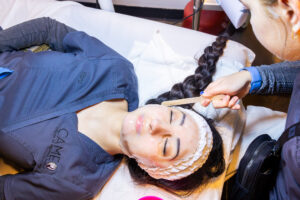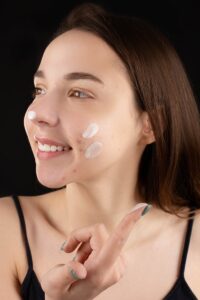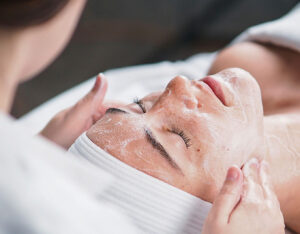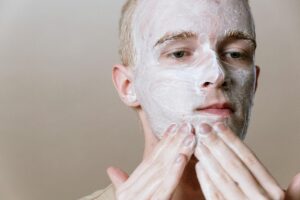Cameo College Guide to Acne Facials: Types, Benefits, and DIY Tips

Acne Facial At Cameo College
Acne, a common skin condition that affects many individuals, can be a source of frustration and self-consciousness. This guide aims to delve into the world of acne facials, exploring the various types available, their associated benefits, and tips for managing acne at home.
Understanding Acne and Facials
Acne, characterized by the presence of pimples, blackheads, whiteheads, and sometimes cysts or nodules, occurs when hair follicles become clogged with oil and dead skin cells. This leads to the growth of bacteria, causing inflammation and redness on the skin. Acne facials are specialized treatments designed to cleanse the skin, extract impurities from pores, and promote healing.
Benefits of Acne Facials
Acne facials offer a range of benefits beyond traditional skincare routines. They can help clear clogged pores, reduce inflammation in acne-prone areas, and improve overall skin texture. Additionally, facials may aid in the removal of excess sebum, dead skin cells, and blemishes, leading to a clearer complexion. These treatments can also target specific types of acne, from mild blackheads to severe inflammatory acne.
Role of Dermatology in Acne Treatment
For individuals with moderate to severe acne, seeking guidance from a dermatologist is essential. Dermatologists can prescribe acne medications, such as salicylic acid or retinoids, to address underlying causes of acne. They may also recommend chemical peels or light therapy to help manage breakouts and reduce scarring. Dermatology plays a crucial role in treating inflammatory acne and guiding individuals towards an effective skincare routine tailored to their specific needs.
Types of Acne Facials

Photo by Anna Nekrashevich on Pexels
When it comes to addressing acne concerns through facials, there are different types designed to cater to specific needs. Understanding the various options available can help you choose the most suitable treatment for your skin.
Extraction Facials
Extraction facials focus on deep cleansing the skin by manually removing comedones, such as blackheads and whiteheads, from the pores. This process helps to unclog pores, prevent future breakouts, and improve the overall texture of the skin. Estheticians are trained to perform extractions safely and effectively to minimize the risk of scarring or skin damage.
Chemical Peel Facials
Chemical peel facials involve the application of a chemical solution to the skin, which exfoliates the top layer of skin, promoting cell turnover and revealing a fresh, new layer beneath. This helps in treating acne by unclogging pores, reducing inflammation, and improving skin tone and texture. Different types of chemical peels are available, ranging from mild to deep, depending on the severity of the acne and skin sensitivity.
Customized Facials for Different Types of Acne
Many spas offer customized facials tailored to address specific types of acne, such as hormonal acne, cystic acne, or inflammatory acne. These facials may incorporate targeted treatments like specialized masks, serums, or LED light therapy to address individual skin concerns. Working with a skincare professional can help determine the best course of action for managing your unique acne condition.
Benefits of Acne Facials

Spa Facial Mask
Acne facials offer a variety of advantages, extending beyond regular skincare practices. They play a significant role in clearing congested pores, diminishing inflammation in acne-prone areas, and enhancing overall skin quality. Moreover, these facials aid in eliminating surplus sebum, dead skin cells, and imperfections, resulting in a more radiant complexion. They are also effective in targeting various types of acne, ranging from mild blackheads to severe inflammatory acne.
How Facials Help Clear Acne
Facials are beneficial in combating acne by deeply cleansing the skin, extracting impurities from pores, and promoting healing processes. The extraction process helps in unclogging pores, preventing future breakouts, and refining skin texture. Estheticians are trained to perform extractions safely, ensuring minimal risk of scarring or skin damage during the procedure.
Improving Skin Health with Facials
Regular acne facials contribute to enhancing skin health by addressing specific concerns such as excess sebum production, dead skin cell buildup, and inflammation. By targeting these issues, facials help in maintaining clear and healthy skin, reducing the likelihood of acne breakouts and promoting a smoother complexion.
Long-term Benefits of Regular Acne Facials
Consistent sessions of acne facials can lead to long-term benefits such as improved skin tone, reduced acne scarring, and minimized breakouts. By incorporating facials into your skincare routine, you can establish a preventive measure against future acne flare-ups and maintain overall skin wellness.
DIY Tips for Acne Facials

Photo by cottonbro studio on Pexels
Embarking on a journey of DIY acne facials can be a rewarding experience, provided you use effective ingredients and follow proper techniques. Here we explore some tips to help you make the most of your at-home acne facial treatments.
Effective Ingredients for DIY Acne Facials
When creating your DIY acne facial, it’s essential to incorporate ingredients that target acne-causing bacteria, unclog pores, and reduce inflammation. Common ingredients like salicylic acid, tea tree oil, honey, and aloe vera possess antibacterial and anti-inflammatory properties ideal for combating acne. Including these ingredients in your facial can help cleanse the skin, prevent breakouts, and promote healing.
Proper Techniques for At-Home Acne Facial Treatments
Before starting your DIY acne facial, ensure your skin is clean and makeup-free. Begin with a gentle cleanser to remove any impurities, followed by exfoliation to slough off dead skin cells and unclog pores. Steam your face or apply a warm compress to open up pores for easier extraction. Be cautious during extraction to avoid scarring, and finish with a soothing mask and non-comedogenic moisturizer to nourish the skin.
Precautions and Safety Measures for DIY Acne Facials
While indulging in at-home acne facials, it’s vital to take precautions to prevent any adverse reactions or skin damage. Always patch test new ingredients to check for allergies or sensitivities. Avoid over-exfoliating, as this can strip the skin of its natural oils and lead to irritation. If you have severe acne or are unsure about a particular ingredient, consult a dermatologist before incorporating it into your DIY facial routine to ensure it’s safe for your skin type.
Frequently Asked Questions about Skincare and Acne
What is acne facial and how does it benefit the skin?
An acne facial is a specialized treatment designed to target acne-prone skin. It involves techniques like extraction to remove impurities, unclog pores, and treat acne. This treatment can help improve skin clarity and reduce breakouts.
What are the different types of acne?
Acne is a common skin condition that can manifest in various forms including pimples, blackheads, whiteheads, cysts, and nodules. Each type of acne may require different treatment approaches.
How important is a consistent skin care routine for acne-prone skin?
A consistent skin care routine is crucial for managing acne. It helps regulate oil production, prevent breakouts, and maintain overall skin health. Using products like moisturizers and serums can also help balance the skin.
When should I consult a dermatologist for acne treatment?
If you have severe acne or if over-the-counter treatments are not effective, it’s recommended to see a dermatologist. They can provide personalized solutions such as acne medications or chemical peels to help clear your skin.
Is exfoliation important for acne-prone skin?
Exfoliation helps remove dead skin cells that can clog pores and lead to breakouts. However, it’s essential to use gentle exfoliants to avoid irritating the skin, especially for those with inflamed acne.
How can facials help improve acne-prone skin?
Facials specifically designed for acne can cleanse the skin, reduce inflammation, and promote healing. Estheticians may use treatments like light therapy or salicylic acid
What should I expect during an acne facial treatment?
During an acne facial, the esthetician will typically start by cleansing the skin to remove any dirt, oil, and makeup. They may then perform a gentle exfoliation to remove dead skin cells and unclog pores.
Next, the esthetician may perform extractions to remove any existing whiteheads or blackheads. This can be slightly uncomfortable but is an important step in clearing up acne-prone skin.
After extractions, the esthetician may apply a mask or treatment solution that is designed to target acne-causing bacteria and reduce inflammation. They may also perform a facial massage to promote circulation and encourage lymphatic drainage.
Finally, the esthetician will apply a moisturizer and sunscreen to protect the skin and prevent any further breakouts.
Overall, you can expect your skin to feel clean, refreshed, and possibly a bit red or inflamed immediately after the treatment. It is important to follow any post-care instructions provided by your esthetician to ensure the best results.

